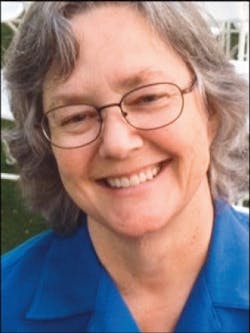“When I started in this industry in the 70s, it was a different time. The first guy that hired me came under a lot of scrutiny. My coworkers wouldn’t talk to me, customers wouldn’t work with me. I was young and ignorant, so I kept going,” Susan Schalk says.
It’s a good thing she did.
Schalk has been interested in mechanics since she was a kid. When she was in high school, she signed up for every industrial arts class she could, including shop. When she wasn’t in school, she worked at both a local tire shop and a restoration shop. Her love of the trade took her on a path that included being recruited by a dealership right out of high school and attending the Ford Factory school in Los Angeles before taking time out of the industry to get her bachelor’s and associate’s degrees in psychology. Schalk was the first woman to pass the California State emissions test, which she did while she was in high school, and she was also the first woman to attain ASE certification for engine repair and engine tune up in 1974.
After the years working with chemicals took a toll on her, Schalk began working at Mitchell 1 as its senior repair information specialist where she currently works on a database that she describes as a “thesaurus for auto parts names.” This year, Schalk became one of 12 recipients and the first woman ever to receive the World Class Technician Award presented by the Auto Care Association.
Women in the automotive field are a minority. How did you get involved with the industry?
I sort of fell into it. When I was in auto shop class in high school, I had a really great instructor who made sure we were up to date on everything. He taught us cutting-edge stuff at the time. I remember when electronic emissions were becoming a hot topic, he made sure we had a vehicle with it to work on.
What do you think allowed you to advance in the field despite the stereotypical gender roles of the time?
There were two things I did that were serendipitous: I got my smog license and I learned how to use a sensorscope. What I didn’t realize at the time was there weren’t many people in the industry that had these skills. Dealerships needed to have people who had their smog license, so I was offered a job right out of high school. When I was working at the dealership, I spent a lot of time in the body shop and I would pick the guys’ brains. I did everything over the years, and all of those years paid off. For the World Class Technician Award, they test everything from diesel to body and paint to commercial vehicles. Most technicians I’ve talked to are specialized. I had an unusual background but my breadth of knowledge and experience has helped me.
“With good mentors early on, women will learn that it’s a viable career option, especially now. ” —Susan Schalk, senior repair information specialis, Mitchell 1
Did the way women were treated in the industry ever get to you?
Yes. That’s honestly part of the reason I went back to school at one point. I got sick of trying to prove myself. When I was just starting out in the industry, the song “Boy Named Sue” had just come out and people used to joke that the song was about me. It’s still an issue now. One of my friends called me recently to help with a car that had broken down. There was a 20-year-old guy there that kept giving me suggestions. My friend was getting so frustrated because I clearly knew what I was doing, but that’s the thing—so many people just don’t want to accept that.
What do you think is holding women back from getting involved in the industry?
I’ve talked to women about it and I’ve given talks on this subject.
I hear a lot of different reasons. Back in my day, it could be traced back to social images. I remember going to parties with my hands stained from the work and I would get strange looks.
What do you think can be done to get more women involved in the industry?
I think it starts with imaging what you’ll be when you grow up.
Children tend to stick within stereotypical job roles for their genders. With good mentors early on, women will learn that it’s a viable career option, especially now. It’s a more technical industry than it ever was before. The Tesla model is something that women should look at. It’s more focused on electronics, which I think could be appealing to a wider range of potential technicians. I think that will open up huge opportunities for women. The nature of work is different than it used to be, but the perception hasn’t changed.

